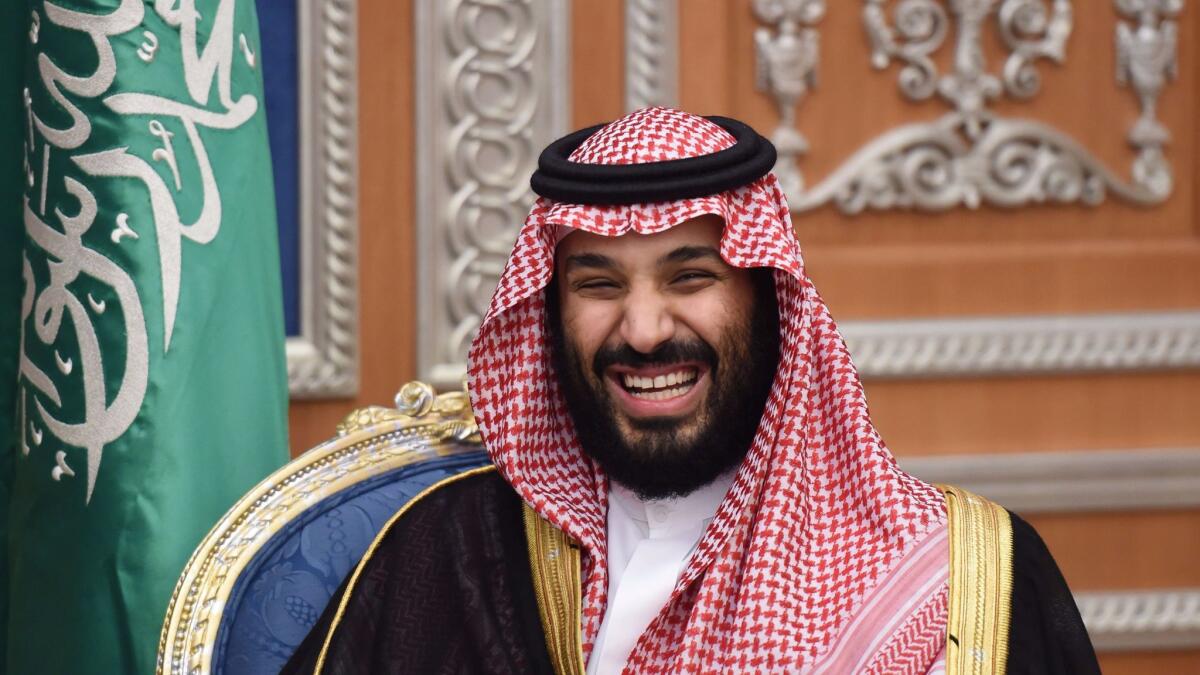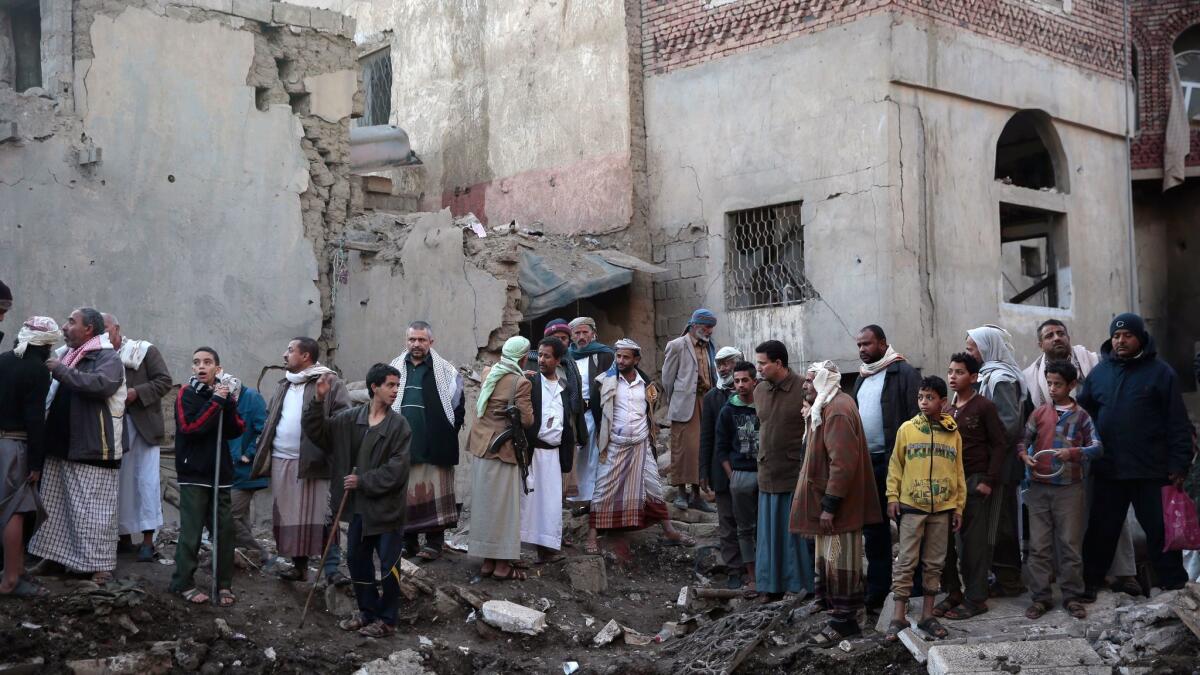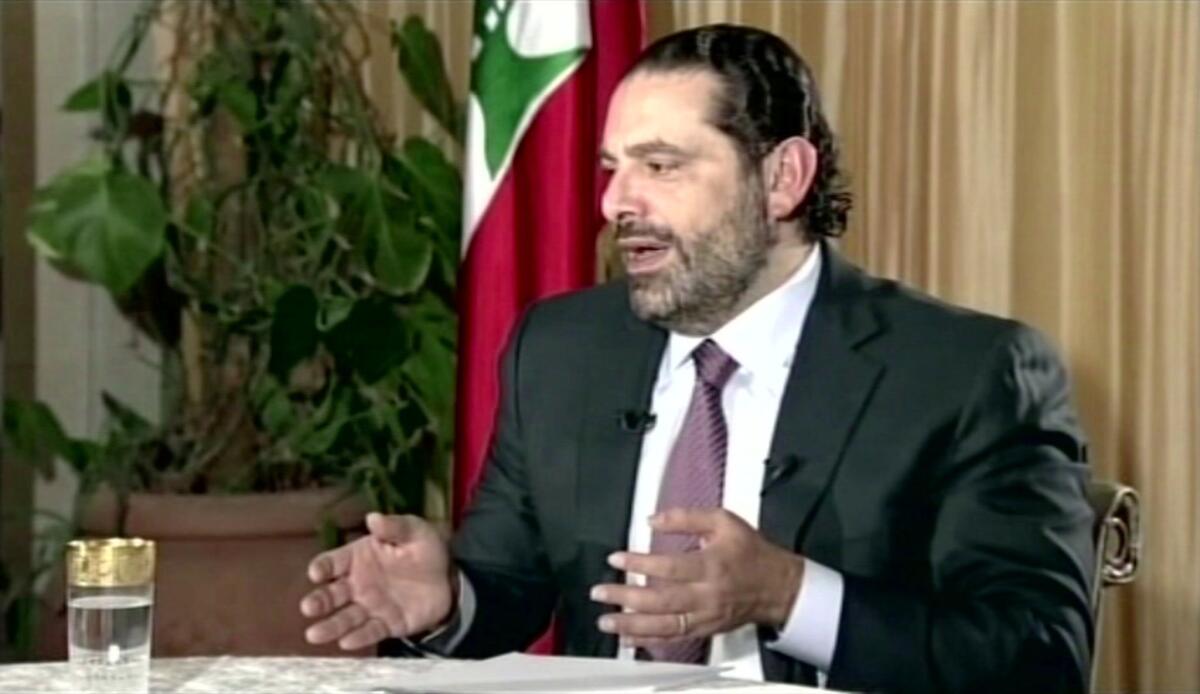A Saudi prince is shaking up the Middle East — and may be pushing it toward war

- Share via
Reporting from Beirut — From the rocky Mediterranean coast to the warm waters of the Persian Gulf, an upstart young Saudi Arabian crown prince is making waves across the Mideast, exploiting and exacerbating the region’s deep sectarian divides.
Why, many wonder, is Mohammed bin Salman, the 32-year-old heir apparent to the Saudi throne, so assiduously fanning the regional flames? And will it lead to a new Mideast war?
It’s all about a long-running rivalry. Saudi Arabia and neighboring Iran are bitter competitors, with each viewing itself as the standard-bearer for its own predominant branch of Islam. The ruling Saudi royal family considers itself the natural leader of the Sunni Muslim world; Iran is the Middle East’s Shiite powerhouse.
At home in Riyadh, the crown prince shocked Saudi watchers this month by engineering the arrest and detention — albeit in luxurious five-star digs — of more than 200 people, including wealthy business figures and royal peers he accused of corruption. Some see him as wanting to make just as indelible a mark on the wider Mideast.
“The sense in Riyadh is that Saudi Arabia has been punching below its weight for decades, and should be the leader of the anti-Iranian camp in the Arab world and beyond,” said Steffen Hertog, who teaches at the London School of Economics and has written a book about the Saudi power structure. Containing Iran, he said, is “probably the dominant motivation behind Saudi foreign policy.”
In tiny Lebanon, there are jitters about just how far Riyadh will go to squeeze the Iranian-backed militia Hezbollah, Lebanon’s most powerful political movement. At the tip of the Arabian peninsula, battered Yemen, beset by famine and cholera, is enduring the most punishing phase yet of a proxy conflict pitting a Saudi-led military coalition against an Iran-aligned rebel group.

Syria, approaching an endgame in its bloody civil war, and Iraq, whose U.S.-friendly government is struggling to retain its footing, have been largely freed from the Sunni extremist group Islamic State’s savage grip on large swaths of both countries — but that liberation is opening new battle space, especially as Iranian-backed armed groups seek to take advantage of a power vacuum.
The Persian Gulf emirate of Qatar, a key American ally and home to a large U.S. military presence, is moving closer to Iran, thanks to what is widely seen as a bungled Saudi-led boycott. And Saudi Arabia seems to be trying its best to goad Israel into a military confrontation with a battle-hardened Hezbollah, a scenario that would shatter an uneasy truce of more than a decade’s standing.
Many analysts say they are at a loss to explain the Saudi crown prince’s behavior, but cite a quickening tempo of seemingly impulsive and boldly assertive acts. All the while, they say, he appears to bask in, and be emboldened by, the vocal approval of President Trump, whose own dislike and mistrust of the Tehran government dovetail neatly with the prince’s own.
“I don’t know if I see a clear end goal in mind,” said Brian Katulis, a Mideast analyst at the Washington-based Center for American Progress, who met with the crown prince this year. “The Saudis are trying to demonstrate unease and unhappiness with Iran, but they can’t compete with what Iran has put in the field” by arming groups across the region.
Against such a backdrop, some analysts cite the risk of a seemingly minor clash igniting a wider conflagration.
Such fears have focused on Lebanon, where this month’s resignation of Lebanese Prime Minister Saad Hariri — apparently forced by the Saudis during what was supposed to have been a brief visit by the prime minister — has upset the delicate balance of power in a fragile country long buffeted by outside forces.

Hariri’s fate has been the subject of much speculation. Lebanon’s President Michel Aoun accused the Saudis of holding Hariri “hostage” in the kingdom, and the Associated Press cited an official in French President Emmanuel Macron’s office as saying Hariri had been invited to come to France and was expected to do so.
Despite the rising tensions, most observers deem it likelier that Saudi Arabia will seek to use economic pressure to try to punish Lebanon for Hezbollah’s prominence and free rein, rather than managing to nudge Israel toward another conflict with the group, with whom it fought a costly and inconclusive war in 2006.
Israel, too, is showing little appetite for a broad new battle with Hezbollah, despite Prime Minister Benjamin Netanyahu’s implacably anti-Iranian stance. Israel’s military planners have generally preferred to deal in “pinpoint” fashion with Hezbollah weapons caches and shipments that pose a threat, analysts say.
“Israel has no interest in a military confrontation,” analyst Amos Harel wrote in the Haaretz newspaper. “But vigorous Saudi actions are fueling tensions in an arena where Israel and Hezbollah are often only two mutual missteps away from war.”
Neutralizing Hezbollah would certainly be a win for Saudi Arabia, which views the armed group as the most effective of Iran’s proxy militias. In Syria, Hezbollah has been a crucial ally of Syrian President Bashar Assad, and Riyadh is adamant in its assertion that the group has a hand in Yemen and elsewhere.
The Saudi-led war against Houthi rebels in Yemen, now in its third year, has caused immense civilian suffering while yielding little in the way of military victory. Its prime architect was the Saudi crown prince, acting in his capacity as the kingdom’s defense minister.
If Prince Mohammed were seeking a pretext to move directly against Iran, the Yemen conflict could provide it. The Houthis, whom Saudi Arabia insists are backed by Tehran, on Nov. 4 launched a ballistic missile targeting Riyadh that was intercepted and destroyed. But it marked an escalation of the rebels’ abilities.
The crown prince accused Iran of bearing responsibility for “an act of war,” and Saudi Arabia tightened an already devastating blockade of Yemen, which was the Arab world’s poorest country even before the war erupted.
Many analysts believe that regional and domestic dynamics will continue to push the crown prince to engage in high-risk behavior, even if he is likely to stop short of direct conflict with Iran.
“He thought the Houthi rebels and Qatar would be easier to bring to heel — there’ve been many miscalculations,” said F. Gregory Gause, a Mideast scholar who heads the international affairs department at the Bush School of Government and Public Service at Texas A&M University.
“I think he has a strategic purpose,” Gause said of the Saudi prince. “But his slips are in implementation.”
ALSO
Millions at risk of famine in Yemen as Saudi Arabia enforces blockade on most ports
Israel’s president tries to soothe rift between Israel and American Jewry
Special correspondent Bulos reported from Beirut and staff writer King from Washington. Special correspondent Noga Tarnopolsky in Jerusalem contributed to this report.
More to Read
Sign up for Essential California
The most important California stories and recommendations in your inbox every morning.
You may occasionally receive promotional content from the Los Angeles Times.










